More Psychiatrists Needed to Meet Pandemic Demand For Mental Health Services
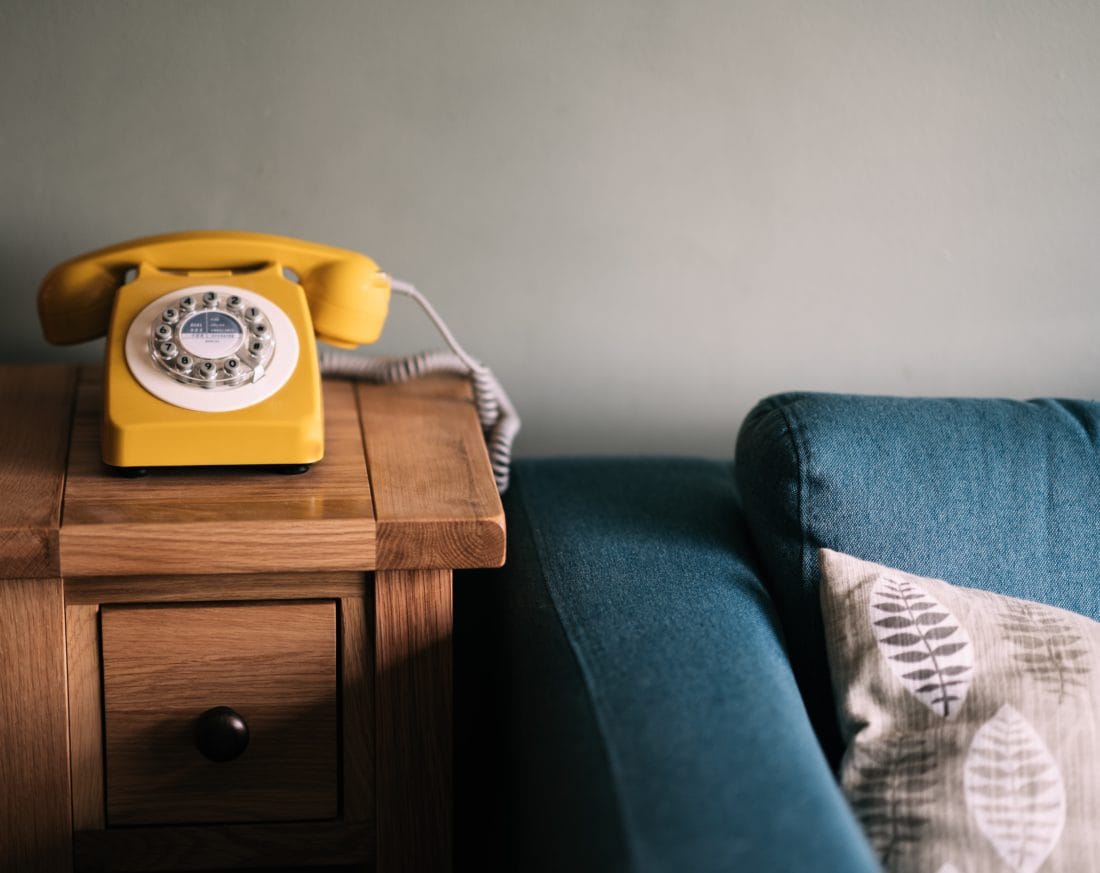
NYC Health + Hospitals is looking to hire new psychiatrists to meet the pandemic induced demand for mental health services. While the campaign is currently open-ended, its focus is on enhancing existing services and making them more accessible to a wider range of people.

Calling for Help
As COVID-19 Pandemic keeps crowding ICUs, flooding emergency rooms, and overwhelming doctors and nurses, it is also taking a mental toll.
NYC Well’s mental health hotlines (call 888-692-9355 or text 65173) received upwards of 6,000 weekly contacts in 2020 after the onset of the pandemic. In 2019, the weekly average was 5,000 contacts.
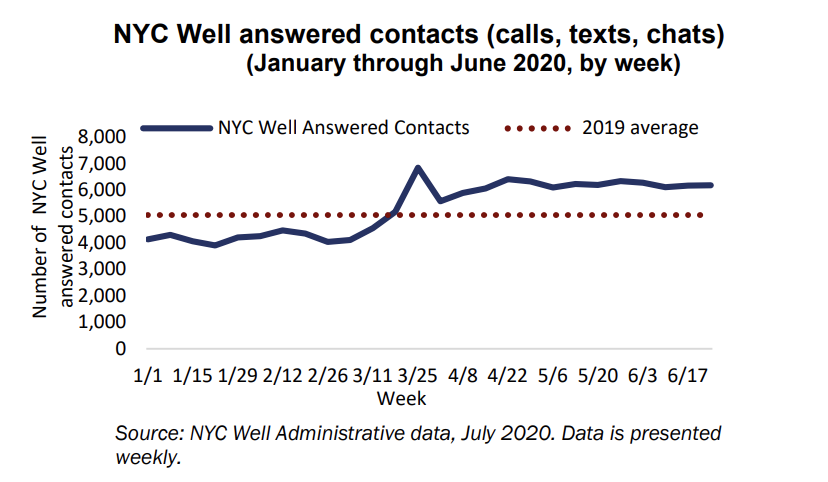
Worries about getting sick, family members dying, isolation, the very high unemployment rates, and the general lack of certainty about the future all contributed to the residents’ mental health concerns. Some 44% of New Yorkers reported feeling more anxious in 2020, 36% felt depressed, and 35% reported their children undergoing increased mental turbulence, the NYC Department of Health found in September 2020.
According to data collected by the Washington Post, emergency hotlines for mental distress have seen a 1,000% increase in traffic on the federal level since the onset of the pandemic. New York City was among the first and hardest-hit cities by the coronavirus and the pandemic related lockdowns in the nation and has therefore suffered higher rates of mental illness – almost 2% more than the national average, which translates to approximately 168,000 additional people.
While psychiatric care has continued through the pandemic, and clinics have largely not closed, their ability to serve clients has been significantly affected by the pandemic.
Different Care
The pandemic has also made receiving necessary treatment more difficult. In addition to increased demand, there are COVID-19 related safety precautions against the airborne disease that complicate in-person care.
While many treatment sessions have been able to continue in person, such meetings last for between 45 minutes to an hour, during which both parties are in close proximity, depending on the patient and their needs. At the Maimonides Department of Psychiatry, patients are not required to undergo routine testing and are only temperature-checked at the entrance. Some facilities have stopped offering in-person care altogether because their offices are so small that adequate social distancing is impossible.
Reidun, a Brooklyn resident, had been following up with a psychiatrist from well before the pandemic began but has noticed that it has had tremendous effects on the course of her treatment. “All of my meetings have been virtual,” she said. “Given the pandemic, this is understandable, but it’s hard to get the same effect from a teletherapy appointment.”
The Neighborhood Counseling Center in Dyker Heights, where she is receiving treatment, has not offered many in-person meetings since the onset of the pandemic and has largely transitioned to online or phone appointments.
A receptionist there confirmed that the reason for this is that most of the clinic’s therapists have chosen to work from home to keep safe and that the clinic is not large enough to host various appointments while maintaining safety procedures.
Despite this, Reidun is grateful to have access to therapy, as she struggles with a generalized anxiety disorder exacerbated by the pandemic. “It’s always important to have an outlet,” she said, “and it’s been crucial to have access to counseling in quarantine.”
Another Brooklyn resident, Mobin, started seeing a therapist recently. Because of the pandemic, he had to move back home from a college upstate, losing his job in the process and stressing through law school applications. He tells us that although he’s always had troubles with depression and anxiety, the dismantling of regular routines by the pandemic pushed him to realize he needed the help of a specialist.
After waiting for several weeks for an appointment at the Maimonides Department of Psychiatry in Borough Park, Mobin was finally assigned to a therapist who he found out was newly brought into the center.
According to NYC Health + Hospitals, local clinics do not usually actively seek out psychiatrists and mental health specialists for hire; under normal circumstances, they can accommodate their patients. However, demand generated by the pandemic has prompted institutions to pursue providers to meet newly increased needs.
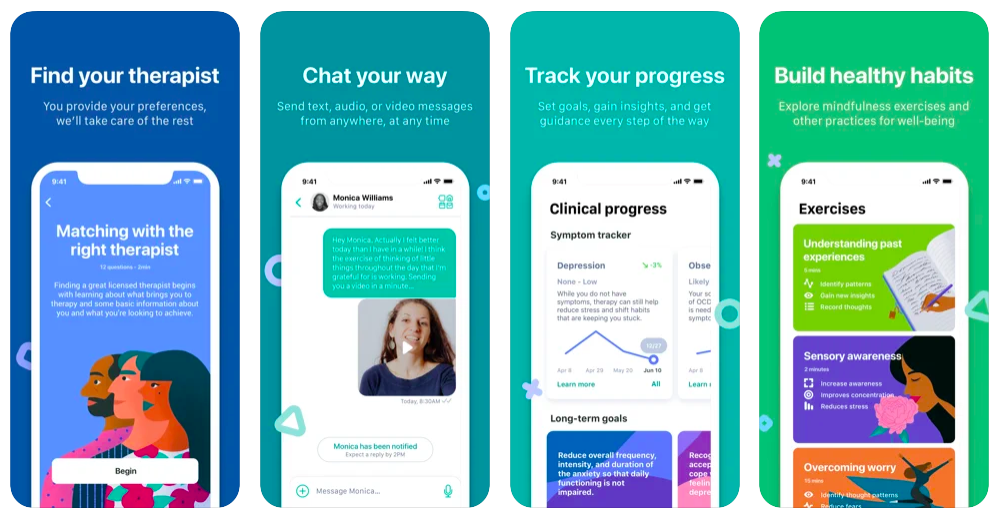
Teletherapy Is Not For Everyone
Teletherapy has been effective in decreasing rates of mental illness induced harm and has increased accessibility to communities without mental health resources. However, it does not help feelings of isolation. Data published by the Journal of Humanistic Psychology, originally collected through a study done by Oxford University, details that humans require interaction with others for mental well being. Loneliness is a “profound human experience” that has detrimental effects on mental health.
While teletherapy may help those struggling with mild symptoms of mental illness, it is not as effective in treating people with serious conditions.
Many clinics and offices are also not well prepared to offer teletherapy. Providers must receive thorough training to practice teletherapy, and the USA was not as prepared as other nations for the transition to telehealth at the onset of the pandemic, researchers at the Alberta Children’s Hospital found.
Furthermore, some patients face economic barriers to teletherapy. To participate, patients need to have access to an internet connection or have a phone they can use to meet with providers, in addition to having a modicum of privacy – not easy with the pandemic restrictions.
Riedun tells us that while her clinic makes video chat available, they only make it available through the platform Vsee, which she found confusing to use. Apps for mental health services are popular, including Talkspace Therapy and Counseling, which allows users to find therapists, chat with them, and track their progress, and Better Help, which assesses a patient’s needs and matches them up with a provider.
In May 2020, Talkspace told the Washington Post that the app saw a 65% increase in traffic due to the pandemic and that many clients had concerns related to it. Similarly, Better Help therapists have also reported to Business Insider that the number of patients with anxiety concerns more than doubled from the previous year.
According to studies published by the American Psychological Association in July 2020, face to face therapy is more effective than teletherapy, but teletherapy has helped abate mental health crises within the context of the ongoing pandemic. Although it may not be sustainable in the long term, it has helped fill gaps through the present circumstances.
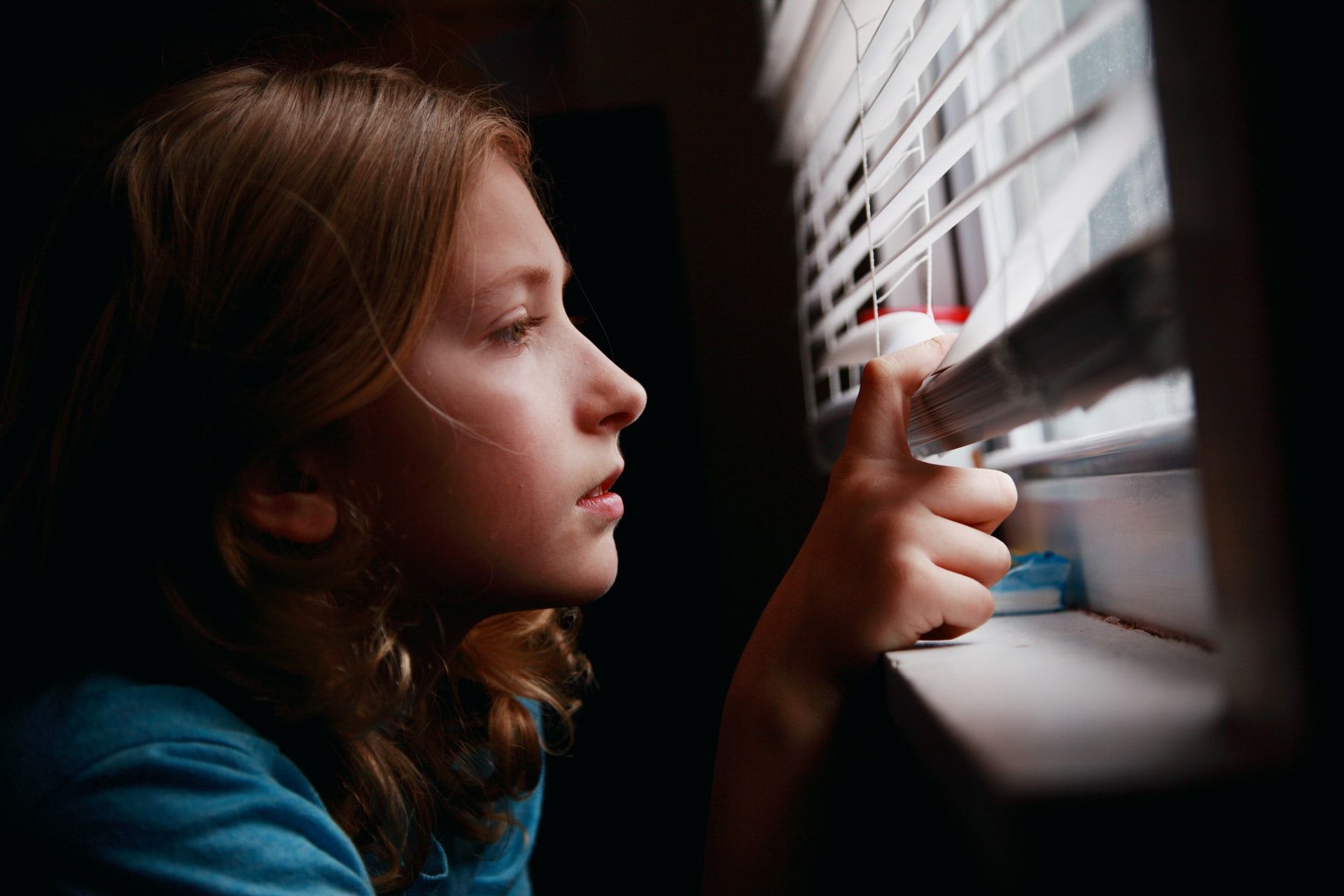
Lack of Providers
The supply of psychiatrists and mental health specialists was already inadequate in meeting patients’ needs before the onset of the pandemic. With the increasing demand for mental health support over the past year, this shortage has grown.
Data collected by Mental Health America in June of 2020, a non-profit for the advancement of community-based mental health initiatives, shows that the percentage of Americans completing online anxiety screenings in 2020 went up 93% from 2019. Rates for those screening for depression increased by 62%, attributed in great part to the Pandemic’s impact.
While about 20% of the overall population experience some mental illness, or about 20,000 people per 100,000, there are just 268.6 mental health providers for every 100,000 people in the country, doctors, therapists, and social workers combined, according to data collected by the United Health Foundation in September 2020.
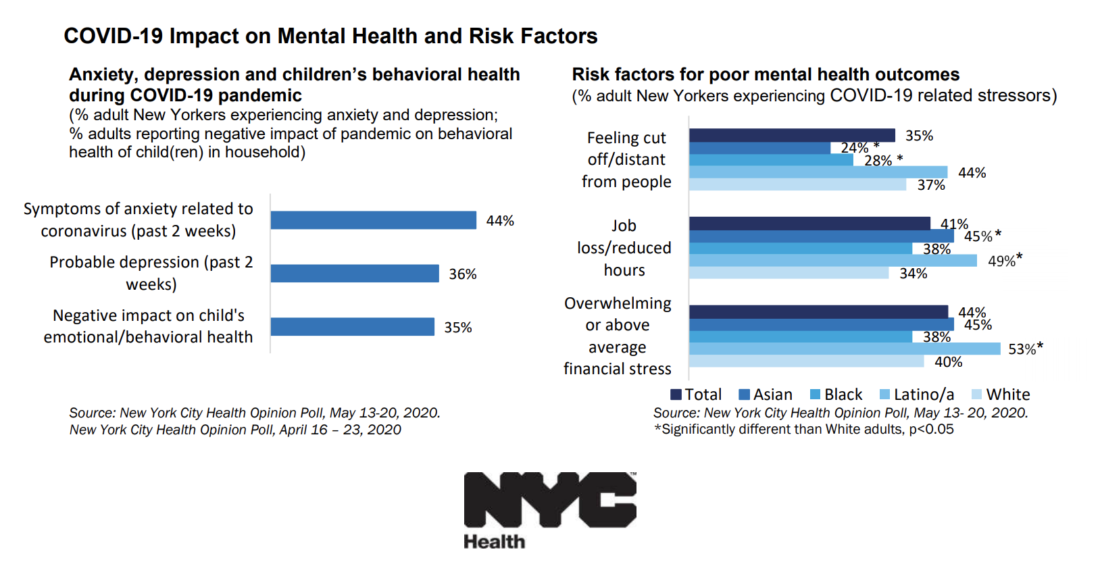
In NYC, there are 313.5 providers for every 100,000, which is just slightly higher than the national average. However, data collected by the NYC Department of Health in September 2020, as shown above, shows that up to 44% of New Yorkers have experienced mental turbulence as a result of pandemic related stressors.
There are just not enough specialists to treat them all, so NYC Health + Hospitals is looking to hire new psychiatrists to meet the pandemic induced demand for mental health services.
“NYC Health + Hospitals is proud to provide more than 50% of all behavioral health care in the City and ensure that care is culturally-competent, high-quality, and affordable to all. The COVID-19 pandemic presented the residents of this City with new mental health challenges, which the public health system is eager to help support,” said NYC Health + Hospitals’ Deputy Chief Medical Officer and Director of the Office of Behavioral Health, Charles Barron, MD announcing the recruitment effort. “Our recruitment efforts will only enhance our mental health services and help keep our promise of providing the best care available to all in need.”
The hospital’s affiliates, including the Physician Affiliate Group of New York (PAGNY), Mt. Sinai, and NYU Langone Health, will also participate in this campaign to recruit more psychiatrists to their respective institutions, working on expanding psychiatric availability to all New Yorkers.
If you need help, please do not hesitate to get in touch with NYC Well Online Chat, NYC Well Mental Health Hotline 888-692-9355, or Text “WELL” to 65173



